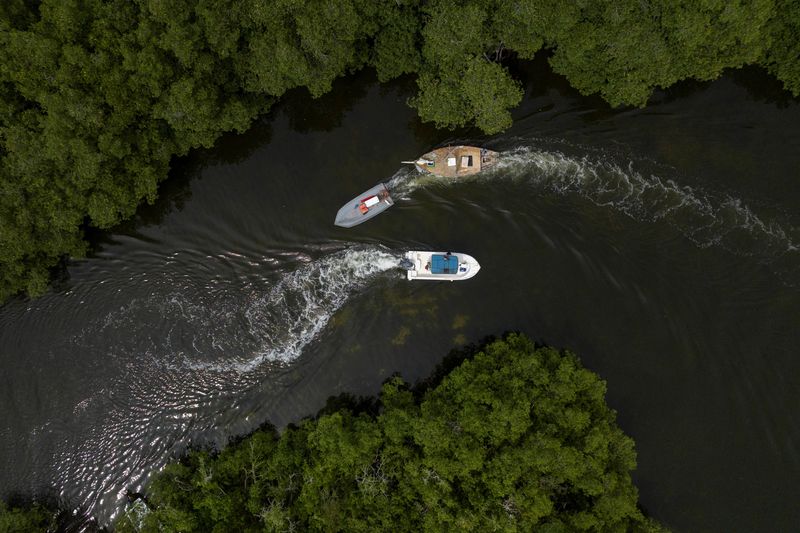
[ad_1]

© Reuters. A small boat tugs a small sailboat to safety as tropical storm Fiona approaches in Cabo Rojo, Puerto Rico September 17, 2022. REUTERS/Ricardo Arduengo
2/2
By Ivelisse Rivera
SAN JUAN, Puerto Rico (Reuters) -Most of the island of Puerto Rico was without power on Sunday as Hurricane Fiona made landfall, causing severe flooding and landslides before barreling toward the Dominican Republic, a government agency said.
The center of the storm made landfall on the southwestern coast of Puerto Rico near Punta Tocon at 3:20 p.m. ET (1920 GMT) with maximum sustained winds of about 85 miles (140 kilometers) per hour, clearing the threshold for a Category 1 hurricane, the National Hurricane Center said.
The NHC said the storm was causing “catastrophic flooding” by early Sunday evening.
Electricity was initially completely out across the island of 3.3 million people, said LUMA Energy, operator of the island’s grid, and the Puerto Rico power authority, on Sunday afternoon. That night officials said some power had begun to be restored, but reconnecting the whole island would take several days.
At a press conference in the capital San Juan on Sunday night, LUMA spokesman Abner Gomez said the entire electrical system had first been shut down to protect its infrastructure. Some power was being restored with priority being given to hospitals and other critical community services, he said.
“This has been catastrophic,” Puerto Rico Governor Pedro Pierluisi said at the news conference. “We are responding to the emergency as weather conditions permit.”
Several landslides had been reported, officials said. Roads were closed and a highway bridge in Utuado, a town in the center of the island, had been washed away by a flooding river.
Puerto Rico’s ports have been closed and flights out of the main airport canceled. Torrential rains and mudslides were also forecast for the Dominican Republic as the storm progresses northwestward, with the Turks and Caicos Islands likely facing tropical storm conditions on Tuesday, the NHC said.
“These rains will produce life-threatening and catastrophic flash flooding and urban flooding across Puerto Rico and the eastern Dominican Republic,” the agency said.
U.S. President Joe Biden approved an emergency declaration for Puerto Rico on Sunday, a move that authorizes the Federal Emergency Management Agency to coordinate disaster relief and provide emergency protective measures.
U.S. Energy Secretary Jennifer Granholm said agency officials deployed to Puerto Rico will assist with restoration efforts “as it becomes safe to do so.”
The rains have increased in intensity since Sunday morning, along with strong wind gusts, residents said.
Denise Rios, who lives in the southwestern town of Hormigueros, said she was left without power following a strong gust of wind and rain that began around noon.
“Since then it hasn’t stopped,” she said. “It is raining heavily and the wind is blowing hard. I’m calm, but alert.”
A wide swathe of Puerto Rico was forecast to get 12 to 16 inches (30 to 40 cm) of rain while parts could be hit by up to 25 inches (63.5 cm), according to the NHC.
Puerto Rico’s grid remains fragile after Hurricane Maria in September 2017 caused the largest blackout in U.S. history. In that Category 5 storm, 1.5 million customers lost electricity with 80% of power lines knocked out.
Authorities have opened more than 100 shelters and closed beaches and casinos, and residents were urged to seek shelter.
One death tied to Fiona has been reported so far, in the French Caribbean island of Guadeloupe. Authorities said one man was found dead on Saturday after his house was swept away by floods. France will recognize a state of natural disaster for Guadeloupe, President Emmanuel Macron said on Twitter (NYSE:) on Sunday.
[ad_2]